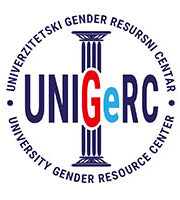University and Gender Mainstreaming
Rector of the University of Sarajevo, Professor Rifat Škrijelj, PhD, emphasized the commitment of the University of Sarajevo to the principles of gender equality, and announced the establishment of a Resource Centre that will serve as a pivot point of the project. “We are glad to be part of this initiative, which makes it easier for higher education institutions and the region to follow the standards of the European Union”.
Universities need to embark on a process of systematic consideration of the differences between the conditions, situations, and needs of women and men in university policies of action, organisation, and knowledge delivery.
Gender mainstreaming
Gender mainstreaming is the (re)organisation, improvement, development, and evaluation of policy processes, so that a gender equality perspective is incorporated into all policies at all levels and all stages, by the actors normally involved in policymaking.
Mainstreaming a gender perspective is the process of assessing the implications for women and men of any planned action, including legislation, policies or programs, in all areas and at all levels. It is a way to make women’s as well as men’s concerns and experiences an integral dimension of the design, implementation, monitoring and evaluation of policies and programs in all political, economic, and societal spheres so that women and men benefit equally, and inequality is not perpetuated. The ultimate goal is to achieve gender equality.
Gender mainstreaming is a complementary strategy and not a substitute for targeted, women-centred policies and programs, gender equality legislation, institutional mechanisms for gender equality, and specific interventions that aim to close the gender gap.
The project “University and Gender Mainstreaming” (UNIGEM) represents universities’ strategic commitment to ensuring gender equality and a safe environment for teaching staff and students at universities in Bosnia and Herzegovina and the region, through the introduction of a gender perspective. The project is funded by the Government of the United Kingdom and Northern Ireland, and it is implemented by the TPO Foundation through regional cooperation with 18 universities from Bosnia and Herzegovina, Croatia, Serbia and Montenegro, with the goal of preventing and combating gender-based violence, discrimination, and sexual harassment, and ensuring the integrity and quality of higher education.
A dedicated body to combat gender-based discrimination is expected to be established at all universities that have signed the Memorandum of Cooperation as part of the project “University and Gender Mainstreaming.”
Gender Equality Council of the University of Sarajevo
At its 42nd regular session held on October 27, 2021, the Senate of the University of Sarajevo passed a Decision establishing the Gender Equality Council of the University of Sarajevo with the aim of preventing and combating gender-based violence, discrimination, and sexual harassment, and ensuring integrity and quality in higher education.
The following members have been appointed to the Council:
- Professor Jasna Kovačević, PhD, Council Coordinator, Faculty of Economics, University of Sarajevo
- Professor Ajla Demiragić, PhD, Member, Faculty of Philosophy, University of Sarajevo
- Professor Valida Repovac, PhD, Member, Faculty of Political Sciences, University of Sarajevo
- Professor Nedžad Korajlić, PhD, Member, Human Rights Centre, University of Sarajevo
- Professor Marija Lučić – Ćatić, PhD, Member, Faculty of Criminalistics, Criminology and Security Studies, University of Sarajevo, and
- Professor Amila Ždralović, PhD, Member, Faculty of Law, University of Sarajevo.
- Administrative and professional support to the Council: Gaj Trifković, PhD, Human Rights Centre, University of Sarajevo.
The Council members’ task is to prepare and carry out the obligations of the University of Sarajevo as defined by the Memorandum of Cooperation within the project “University and Gender Mainstreaming – UNIGEM” in collaboration with the signatories of the Memorandum of Cooperation and other partners and beneficiaries of the UNIGEM project.


